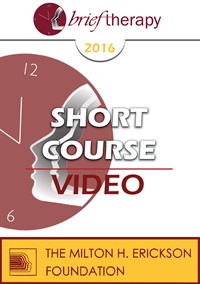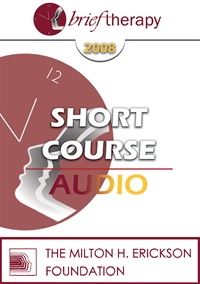
- Average Rating:
- Not yet rated
- Topic Areas:
- Short Courses | Addiction | Hypnosis | Trance | Trauma | Brief Therapy | Dissociation
- Categories:
- Brief Therapy Conference | Brief Therapy Conference 2008
- Faculty:
- Albina Tamalonis, PsyD
- Duration:
- 1:31:45
- Format:
- Audio Only
- Original Program Date:
- Dec 11, 2008
- Short Description:
- People who are traumatized, and/or have one of the multitudes of addictive disorders are, in great part, dissociated from their physical reality. There is research which indicates that people who exercise are more likely to suffer from less anxiety, pain and depression. This short course offers a practical approach to overcoming people's reluctance to exercise by using active-alert hypnosis and music. By listening to hypnosis with music while exercising, people can alter their perceptions of pain, time, effort and pleasure. The words of the hypnosis are taken from the works of Milton H. Erickson, Jeffrey Zeig, Michael Yapko and Eva Banyai. Their different contributions will be delineated and explained.
- Price:
- $15.00 - Base Price

- Average Rating:
- Not yet rated
- Topic Areas:
- Short Courses | Habits | Addiction | Ericksonian Hypnosis and Therapy Techniques | Brief Therapy
- Categories:
- Brief Therapy Conference | Brief Therapy Conference 2008
- Faculty:
- Joseph Dowling, MS, LPC
- Duration:
- 1:31:47
- Format:
- Audio Only
- Original Program Date:
- Dec 11, 2008
- Short Description:
- This short course will emphasize a four session smoking cessation model that will provide attendees with an Ericksonian template to be utilized in the treatment of smoking, weight loss, nail-biting, obsessive thinking, compulsive behavior and addictive behavior. An Ericksonian template for habit control can be formulated to the unique symptomology and strengths of each individual client. There will be a detailed discussion of the four session smoking cessation model with case studies, experiential exercises and a live demonstration.
- Price:
- $15.00 - Base Price
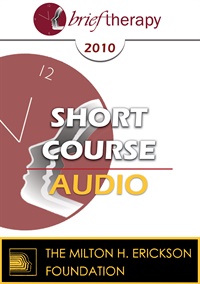
- Average Rating:
- Not yet rated
- Topic Areas:
- Addiction | Short Courses | Brief Therapy | Communication | Mind-Body | Utilization
- Categories:
- Brief Therapy Conference | Brief Therapy Conference 2010
- Faculty:
- Bart Walsh, MSW
- Duration:
- 1:32:27
- Format:
- Audio Only
- Original Program Date:
- Dec 09, 2010
- Short Description:
- This presentation poses a substance abuse treatment which acknowledges and accommodates the personal needs being addressed by substance use, bypasses perceived resistance and employs idiosyncratic psycho-biological learning to achieve a mind-body gestalt complementary to the client’s sobriety. Client self-empowerment and relapse prevention are built into the intervention. This method develops a safe framework for addressing any subsequent mental health themes directly or indirectly related to substance misuse. A simple form of mind-body communication known as ideomotor questioning is employed in this procedure. Because this is a new strategy, fundamental information applicable to all levels of professional experience will be provided.
- Price:
- $15.00 - Base Price
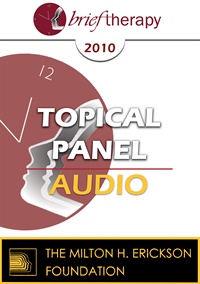
- Average Rating:
- Not yet rated
- Topic Areas:
- Addiction | Topical Panels
- Categories:
- Brief Therapy Conference | Brief Therapy Conference 2010
- Faculty:
- Frank Dattilio, PhD, ABPP | Esther Perel, MA, LMFT | Reid Wilson, PhD
- Duration:
- 59:06
- Format:
- Audio Only
- Original Program Date:
- Dec 11, 2010
- Short Description:
- BT10 Topical Panel 12 - Addictive Behavior - Frank Dattilio, PhD, ABPP, Esther Perel, MA, LMFT, Reid Wilson, PhD
- Price:
- $15.00 - Base Price
Tags: Addiction
- Average Rating:
- Not yet rated
- Topic Areas:
- Keynotes | Addiction
- Categories:
- Brief Therapy Conference | Brief Therapy Conference 2012
- Faculty:
- Patrick Carnes, PhD, CAS
- Course Levels:
- Master Degree or Higher in Health-Related Field
- Duration:
- 1:07:07
- Format:
- Audio and Video
- Original Program Date:
- Dec 08, 2012
- Short Description:
- BT12 Keynote 04 – Bargains with Chaos: Challenges and Choices – Patrick Carnes, PhD, CAS We witness a continuous parade of stars, financial gurus, clergy, politicians and athletes who enter rehabs sometimes repetitively. Is this about media coverage or are these elite canaries in the coal mines of our culture signifying a greater danger? Our understanding of addictions with the aid of neuroscience is expanding dramatically. With it is the realization of cultural and scientific shifts which underline the therapist’s role in facing our number one public health problem. One of the gifts of this challenge is our growth in technology which will transform what every therapist does for a living and maybe how humans evolve. But maybe we professionals are like the famous—reluctant to face difficult realities.
- Price:
- $29.00 - Base Price
Tags: Addiction Neuroscience

- Average Rating:
- Not yet rated
- Topic Areas:
- Addiction | Workshops | Pain and Healing
- Categories:
- Brief Therapy Conference | Brief Therapy Conference 2012
- Faculty:
- Roxanna Erickson Klein, RN, PhD, LPC, LCDC | Mary Ellen Bluntzer
- Duration:
- 2:45:07
- Format:
- Audio Only
- Original Program Date:
- Dec 06, 2012
- Short Description:
- BT12 Workshop 20 – The Treatment Interface of Chronic Pain and Substance Dependency – Roxanna Erickson-Klein, PhD and Mary Ellen Bluntzer, MD This workshop offers medical and psychotherapy professionals an approach for the management of chronic pain conditions. Specifically intended for work with patients at risk for medication dependence techniques are taught that involve self-assessment and active participation, both integral to the healing process. The use of creative imagination and hypnotic strategies offer opportunities for the subjective perceptual alterations, which can be used in the adaptation to chronic discomfort.
- Price:
- $15.00 - Base Price
- Average Rating:
- Not yet rated
- Topic Areas:
- Addiction | Short Courses | Utilization | Mind-Body
- Categories:
- Brief Therapy Conference | Brief Therapy Conference 2016
- Faculty:
- Bart Walsh, MSW
- Course Levels:
- Master Degree or Higher in Health-Related Field
- Duration:
- 1:30:02
- Format:
- Audio and Video
- Original Program Date:
- Dec 08, 2016
- Short Description:
- This presentation poses a substance abuse treatment which acknowledges and accommodates the personal needs being addressed by substance use, bypasses perceived resistance and employs idiosyncratic psycho-biological learning to achieve a body-mind gestalt complementary to the client’s sobriety. Client self empowerment and relapse prevention are built into the intervention This method develops a safe framework for addressing any subsequent mental health themes directly or indirectly related to substance misuse. Ideomotor questioning is employed as a practical conduit to body-mind communication and function.
- Price:
- $0.00 - $29.00
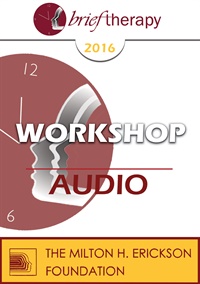
- Average Rating:
- Not yet rated
- Topic Areas:
- Psychotherapy | Workshops | Generative Psychotherapy | Addiction | Anxiety | Depression | Trauma
- Categories:
- Brief Therapy Conference | Brief Therapy Conference 2016
- Faculty:
- Stephen Gilligan, PhD
- Duration:
- 2:36:56
- Format:
- Audio Only
- Original Program Date:
- Dec 09, 2016
- Short Description:
- This workshop presents the Generative Psychotherapy approach to human states of suffering--depression, anxiety, trauma, addiction, etc. This practical and positive approach assumes that each core human experience has equivalent potential to be positive or negative, depending on the human relationship to it; and thus focuses on how problems may be transformed to resources by skillful human connection.
- Price:
- $15.00 - Base Price
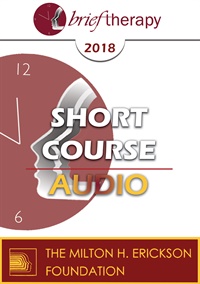
- Average Rating:
- Not yet rated
- Topic Areas:
- Short Courses | Addiction | Brief Therapy | Rational Emotive Behavior Therapy (REBT) | Solution Oriented Approach
- Categories:
- Brief Therapy Conference | Brief Therapy Conference 2018
- Faculty:
- JULIA ALPEROVICH, MS
- Duration:
- 1:25:51
- Format:
- Audio Only
- Original Program Date:
- Dec 06, 2018
- Short Description:
- This presentation will introduce a short-term model of treatment incorporating solution-focused, rational emotive behavioral, and systems theory interventions for residential or intensive outpatient drug and alcohol treatment.
- Price:
- $15.00 - Base Price
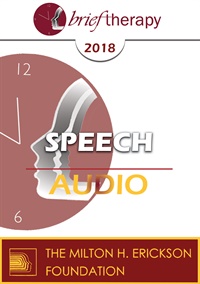
- Average Rating:
- Not yet rated
- Topic Areas:
- Speeches | Trauma | Neurobiology | Neuroscience | Research | Addiction | Memory
- Categories:
- Brief Therapy Conference | Brief Therapy Conference 2018
- Faculty:
- Janina Fisher, PhD
- Duration:
- 1:05:26
- Format:
- Audio Only
- Original Program Date:
- Dec 09, 2018
- Short Description:
- Neuroscience research has established why it is that trauma results in a fragmented narrative along with a ‘living legacy’ of enduring effects. The survival responses that preserve life and integrity under threat do not diminish once safety is obtained. Meant to warn us of impending danger, these easily re-activated survival responses continue to re-evoke the events of long ago decades after they are over. Once baffling and frustrating to treat, the evolution of new neurobiologically-informed treatments offers new, hopeful answers to the aftermath of trauma: the chronic fear of danger, dread of impending doom, loss of hope or energy, the longing for human connection, and self-destructive and addictive behavior.
- Price:
- $15.00 - Base Price
Please wait ...



